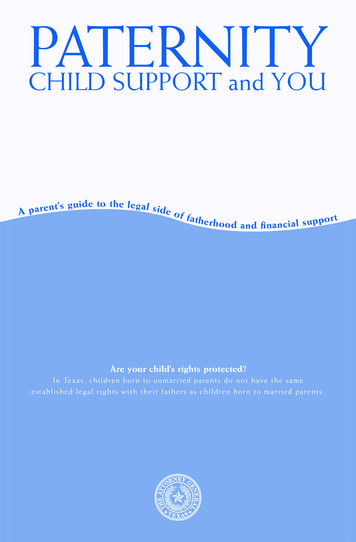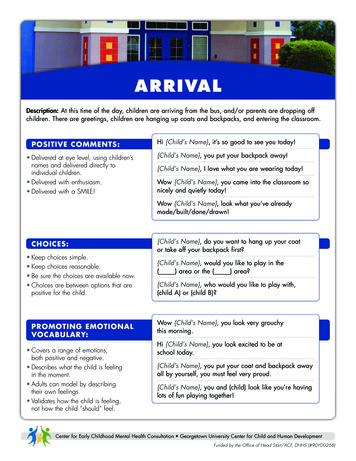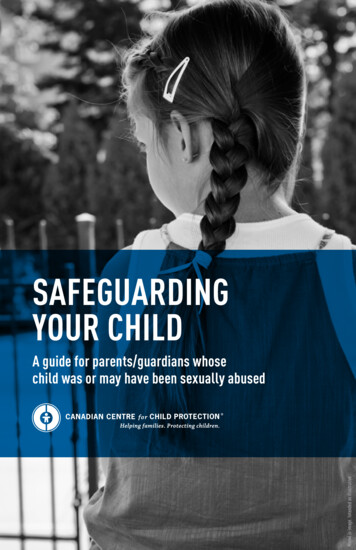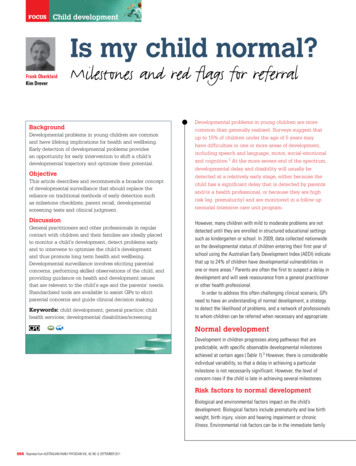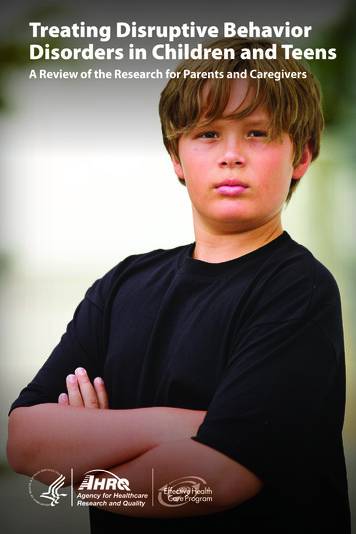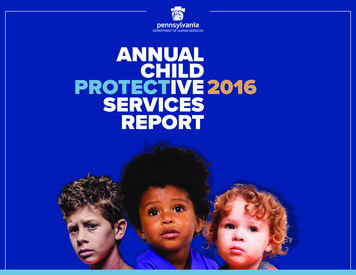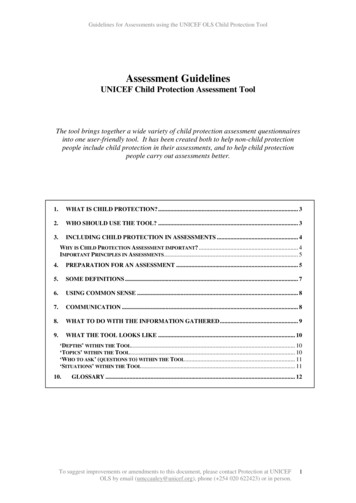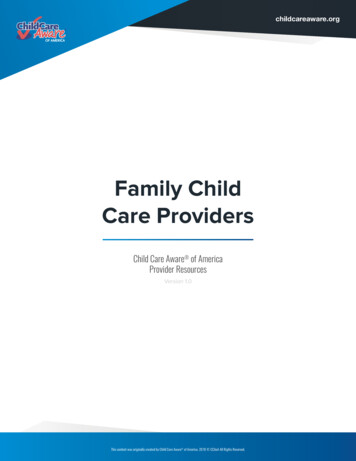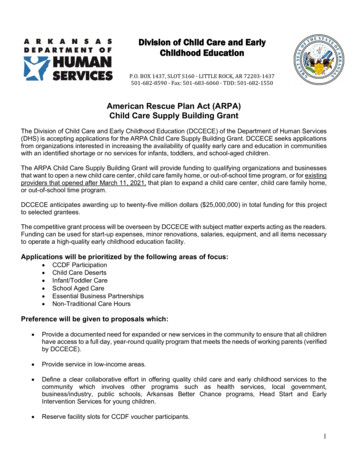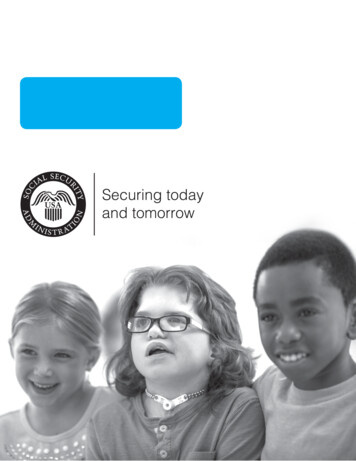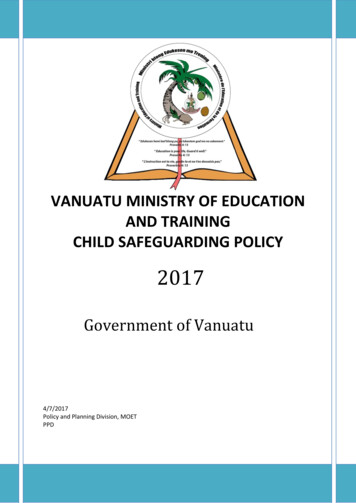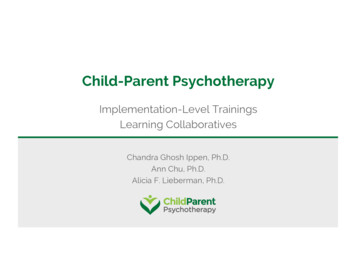
Transcription
Child-Parent PsychotherapyImplementation-Level TrainingsLearning CollaborativesChandra Ghosh Ippen, Ph.D.Ann Chu, Ph.D.Alicia F. Lieberman, Ph.D.
18-Month CPP Learning CollaborativeOverview
Acknowledgements The CPP Learning Collaborative model was adapted fromthe National Child Traumatic Stress Network (NCTSN). For more information about the NCTSN LearningCollaborative model, please see the NCTSN TOOLCITCurriculum: http://learn.nctsn.org/course/view.php?id 1013
18-Month Learning Collaborative OverviewLearning Session 3 Learning Session 1 3 days (minimum) Core CPP didactics6 months consult calls6 months consult callsLearning Session 2 2 days (minimum)Competency buildingCase-basedParticipant driven2 days minimumCompetency buildingCase-basedParticipant driven6 months consult callsEnd of Training4
CPP Learning Collaborative Videos to WatchTeam ApproachOptional ComponentsTraining ComponentsRostering5
Implementation-Level Training in CPPImportance of Teams6
CPP LC Teams Typically teams rather than individuals participate in CPP training A team ideally consists of– Psychotherapists/Clinicians: Ideally 3 or more– Supervisor(s): At least 1, ideally more (3 for futuresustainability)– Senior leader(s): Ideally at least 17
Team Member Activities and Responsibilities Psychotherapists/Clinicians– Provide direct clinical service– Offer feedback about how model aligns with current agency Client population Needs Policies and practices8
Team Member Activities and Responsibilities Supervisors– Provide reflective supervision– Responsible for coordinating the learning of the team Knowledge of early childhood development Core skills (e.g. trauma screening)– Think with team about how trauma work impacts them andpotential shifts in agency policies and practices that may supportthe work and the team– Critical for future sustainability within the agency9
Team Member Activities and Responsibilities Senior Leaders– Individuals who are able to effect agency-level changes– Able to make changes to align agency and CPP practices andpolicies– Knowledgeable about funding sources and how current billingpractices align with CPP practices– Attend any aspects of the LC they can Ideally Learning Session 1 to understand CPP Senior leader calls if included as part of this LC10
Teams in Rural Areas In areas with limited services or where services aretypically provided by private practitioners, individualpractitioners may participate in CPP LC provided that:– They are licensed– They form teams and agree to meet with a partner forreflective CPP consultation for the duration of the LC,ideally once a week but a minimum of 2x per month (onweeks when there is no consultation call)11
Rationale for Teams Reflective supervision is an integral part of CPPTherapists benefit from the support of a team as they learn a traumatreatment. The team works together to. . .– Prevent and address vicarious traumatization– Develop a culture of self care and team careTeam members support each other in considering how historical,contextual, and socio-cultural factors shape perspective and behaviorSustainability– Particularly important to include multiple supervisors when the goalof participation is sustainability– See CPP Agency Mentorship Program (C.A.M.P.) video12
Team Members Clinical team members must be masters or doctoral-levelpsychotherapists with a degree in a mental health discipline Some trainers may accept MFTIs and Postdoctoral students, butthey are not eligible for the roster until they are licensed This training is not considered intensive enough for students (e.g.practicum students and psychology interns) to learn the model– Students typically require more supervision, training, additionaldidactics, and more direct contact with families to learn themodel– CPP training is offered to students through endorsed CPPinternships13
Team Members: Licensure Requirements Team members who are not yet licensed must be supervised bya licensed team member who is participating in the LC or whohas completed an Implementation-Level CPP training before Should that supervisor leave the agency or end his/herparticipation in the LC, arrangements must be made to have nonlicensed staff supervised by a licensed supervisor who has beenor is being trained in CPP14
Unlicensed Team Members: If Supervisors LeaveIf there are no available licensed CPP supervisors within the agency, there are twooptions for continuing. Option 1: A licensed supervisor who has not yet been trained in CPP may serve assupervisor of record– At a minimum, supervisor needs to participate in CPP consult calls withsupervisee so as to become aware of the model and understand how CPPmay influence supervisee’s clinical work.– New supervisor would not be eligible for the CPP roster unless s/hecompletes a full CPP Implementation Level course.– Unless specific exceptions have been made in consultation with the CPPDevelopment Team, participation in consult calls is not counted towards anImplementation Level Course until after a participant attends the Initial CPPdidactic training15
Unlicensed Team Members: If Supervisors Leave Option 2: The agency could contract separately with a licensed clinical supervisorwho is trained in CPP, resides within that state, and is willing to provide clinicalsupervision and serve as the supervisor of record.16
CPP Learning CollaborativeTraining Components17
18-Month CPP LC OverviewLearning supported by 8 required learning components1. Didactics (18 hour minimum)2. Read CPP manual3. Conduct CPP 2 cases for Supervisor Participants; 4 cases for ClinicianParticipants4. Reflective CPP supervision within the agency5. Ongoing consultation calls6. Case presentation7. Intensive CPP competency building workshops8. Fidelity monitoring18
Training Components Required learning components for CPP LearningCollaboratives organized after April 2018 Trainings arranged prior to 2018 may have slightly differentrequirements19
CPP LC Components: Didactics1. Participate in Core CPP Didactics 18-hours of didactics Typically conducted through a 3-day training May be broken into smaller segments20
CPP LC Components: Read the Manuals2. Read the Manuals Required: Lieberman, A.F., Ghosh Ippen, C., & Van Horn, P. (2016)Don’t Hit My Mommy: A Manual for Child-Parent Psychotherapywith Young Children Exposed to Violence and Other Trauma,Second Edition. Washington, DC: Zero to Three. Strongly Recommended: Lieberman, A.F., & Van Horn, P. (2008).Psychotherapy with Infants and Young Children: Repairing theEffects of Stress and Trauma on Early Attachment. New York: TheGuilford Press.21
CPP LC Components: Provide CPP3. Work with Families Using CPP Clinician Participants: At least 4 cases in the 18-month period Supervisor Participants: At least 2 cases in the 18-month period At least two cases must be treated for at least 16 sessions– At least 1 of these must have started from the beginning andincluded the foundational phase– Both must have included dyadic sessions For Clinician Participants, the other two families must be seen for atleast 4 face-to-face sessions in any treatment phase22
CPP LC Components: Provide CPP3. Work with Families Using CPP (continued) For each family– Child is under age 6 (at intake)– Child has experienced at least one trauma (may include separationfrom a primary caregiver)– For those working with at least 4 families, for one case, oneexception can be granted– child who is age 6– pregnant mother or baby under age 18 months where thecaregiver’s trauma history is the primary reason for referral23
CPP LC Components: Provide CPP3. Work with Families Using CPP (continued) Requirement typically completed during the course of the 18-month LC May grant an extension provided that:– The participant treated at least one case for at least 16 sessionsduring the LC– The person has completed most of the other components of the LC– The person continues in CPP supervision (minimum twice monthly)at their agency with a supervisor trained in CPP until they completethis requirement– This requirements is completed within 3 years of finishing an LC24
CPP LC Components: Reflective CPP Supervision4. Participate in Reflective CPP Supervision Consistent space where clinicians and supervisors can reflect ontheir CPP work within their own agencies Discuss– Impact of trauma on the provider– Alignment of CPP and agency procedures– Support for learning core CPP competencies (e.g. screeningfor trauma) Team members contribute different perspectives and expertise Develop a culture of team learning Enhances sustainability25
CPP LC Components: Reflective CPP Supervision4. Participate in Reflective CPP Supervision (continued) Agency supervisors provide CPP supervision– Individual or group– Ideally once a week– Minimum 2x per month(on weeks when there is no consultation call) Supervisors may be learning CPP at the same time as clinicians Agency supervisors also benefit from reflective consultation andideally should reflect with either their teams or with another CPPsupervisor26
CPP LC Components: CPP Consult Calls5. Participate in CPP Consultation Calls Case-based learningShare interventions (what you did and said), not just family historyNot expected to be doing CPP yetConsultation on the model not just on the “case”Highlight strengthsConceptualize the case using CPPLook at where the work is reflective of CPPLook at divergences from CPPExplore alternate ways to intervene27
CPP LC Components: CPP Consult Calls5. Participate in CPP Consultation Calls (continued) Attend at least 70% of calls during the 18-month period Minimum of 23 calls Consultants will make every effort to provide a minimum of 33calls Expected to take vacations for self-care28
CPP LC Components: Case Presentation6. CPP Case Presentation Present at least twice during ongoing CPP consult calls unlessgroup size does not permit this Complete case presentation template & provide clinical materialfor reflection 48 hours before presenting29
CPP LC Components: CPP Competency Workshops7. Participate in Intensive CPP Competency Building Workshops Learning Session 2– Typically 2-days (12 hours minimum)– Approximately 6 months after the core CPP didactic training(Session 1) Learning Session 3– Typically 2-days (12 hours minimum)– Approximately 12 months after the core CPP didactic training(Session 2)30
CPP LC Components: CPP Competency Workshops7. Participate in Intensive CPP Competency Building Workshops(continued) Content tailored to the needs of participants Case-based learning Multiple case presentations Active dialogue and practice31
CPP LC Components: Fidelity Monitoring8. Fidelity Monitoring Two fidelity clients– Ideally one high challenge and one low challenge– If a fidelity case ends prior to completing 16 sessions, beginfidelity monitoring with another case– Review measures for each phase with a supervisor or colleague As required by your LC Trainer– Complete supervision fidelity– Complete consultation fidelity32
Begin Working with FamiliesBegin Using Fidelity MeasuresCPP Supervision in AgencyConsult CallsTrack FidelityStandard CPP Learning Collaborative Path à Learning Session 3Senior Leader InvolvementLearning Session 2Learning Session 118-Month Learning Collaborative ComponentsEnd of TrainingGhosh Ippen, Van Horn, Lieberman, 201633v
Optional but Highly RecommendedTraining Components34
Optional but Highly RecommendedComponents1. Support during Pre-Work Phase– Think about the LC application procedure– Identify agency teams that are most likely to sustain the model andto serve families in need– Think about any knowledge gaps that may need to be addressed Knowledge of infants, toddlers, and preschoolers Relationship assessment Sociocultural considerations Trauma-informed systems Interfacing with specific systems35
Optional but Highly RecommendedComponents2. Supervisor Call– Held only with supervisors– Supervisors present supervision cases and discuss CPP supervision– Typically once a month (schedule determined with trainer)– Particularly helpful when supervisors are learning at the same timeas supervisees– Support future sustainability36
Optional but Highly Recommended Components3. Senior Leader Call– Recommended particularly for large systems– Typically one call every quarter or every 6 months (scheduledetermined with trainer)– Think together about: Any challenges aligning CPP and systems’ policies andprocedures Match for client population Ways to support learning Sustainability37
Optional but Highly Recommended Components4. Foundational Trainings Offered by some trainers to help participants gain knowledge core toCPP Different CPP trainers have different areas of expertise38
Optional but Highly Recommended Components4. Foundational Trainings (continued) Potential topics– Child development– Reflective supervision– Caregiver-child relationship assessment– Partnering with specific systems (child welfare, courts)– Early childhood trauma– Trauma-informed systems– Diversity-informed practice– Engagement39
Rostering in CPP40
DO WE CERTIFY IN CPP?
What do CPP and the insanity workouthave in common?
Results may vary based on. . .START POINTGOALSEFFORT
WE DO NOT CERTIFY,BUT WE DO ROSTER
CPP Roster Therapists who complete the minimum requirements for anImplementation-Level Course are invited to be on the CPP rosterTo be rostered, therapists must also Have a Master’s degree or above in a mental health discipline Hold professional licensure in home state and any state thattherapist lists on the roster as part of a clinical practice45
CPP Roster Therapist enters own information– Photo– Brief Bio– Contact information (for multiple sites)– Insurance– Languages spokenTherapist is able to update information if therapist changes jobsor movesInformation is shared via public websites, searchable mapsFamilies and systems can easily find CPP therapists46
CPP Map: Locating Trained Providers47
Implementation-level CPP Training18-Month CPPLearningCollaborativeCPP AgencyMentorshipProgram(C.A.M.P.)Endorsed CPPInternship48
Option 1: A licensed supervisor who has not yet been trained in CPP may serve as supervisor of record - At a minimum, supervisor needs toparticipate in CPP consult calls with supervisee so as to become aware of the model and understand how CPP may influence supervisee's clinical work.
